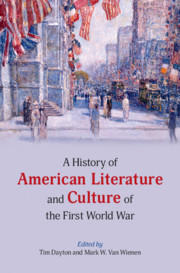Book contents
- A History of American Literature and Culture of the First World War
- A History of American Literature and Culture of the First World War
- Copyright page
- Contents
- Figures
- Contributors
- Acknowledgments
- Introduction America’s Great War at One Hundred (and Counting)
- Part I Genre and Medium
- Part II Settings and Subjects
- Chapter 9 The Peace Movement
- Chapter 10 Americans in France
- Chapter 11 German Americans
- Chapter 12 The English in America
- Chapter 13 Preparedness
- Chapter 14 Propaganda
- Chapter 15 Conscientious Objectors
- Chapter 16 Volunteers
- Chapter 17 African Americans
- Chapter 18 In the Midwest
- Chapter 19 In the South
- Chapter 20 Revolution
- Chapter 21 Monuments and Memorials
- Part III Transformations
- References
- Index
Chapter 20 - Revolution
Winning the World, Losing the (Middle) Way
from Part II - Settings and Subjects
Published online by Cambridge University Press: 23 January 2021
- A History of American Literature and Culture of the First World War
- A History of American Literature and Culture of the First World War
- Copyright page
- Contents
- Figures
- Contributors
- Acknowledgments
- Introduction America’s Great War at One Hundred (and Counting)
- Part I Genre and Medium
- Part II Settings and Subjects
- Chapter 9 The Peace Movement
- Chapter 10 Americans in France
- Chapter 11 German Americans
- Chapter 12 The English in America
- Chapter 13 Preparedness
- Chapter 14 Propaganda
- Chapter 15 Conscientious Objectors
- Chapter 16 Volunteers
- Chapter 17 African Americans
- Chapter 18 In the Midwest
- Chapter 19 In the South
- Chapter 20 Revolution
- Chapter 21 Monuments and Memorials
- Part III Transformations
- References
- Index
Summary
American political and literary discourses in the Great War era were infused with revolutionary rhetoric. In 1912, the major-party nominees for president as well as the Socialist candidate, Eugene Debs, promised revolutionary change.In 1914, many initial commentators on the war, whether Vachel Lindsay or radicals of The Masses magazine, recognized its class-war implications. Even as President Wilson led an intervention seeking regime change in Central Europe, the antiwar Industrial Workers of the World (IWW) sought industrial-democratic regime change at home. While the February revolution in Russia was widely applauded by Americans, the November revolution led by the Bolsheviks sharply divided US opinion. Ten Days That Shook the World, by American journalist John Reed, not only defended Lenin’s methods but encouraged their application in the United States. But counterrevolution held the upper hand in the country, as IWW leaders were sentenced to long prison terms and other radical groups were suppressed in the postwar Palmer raids. Upton Sinclair’s novel Jimmie Higgins both deplored the ill-conceived 1918-19 US military intervention against the Bolsheviks and grieved the loss of a legal, parliamentary path to social democracy in the United States.
Keywords
- Type
- Chapter
- Information
- Publisher: Cambridge University PressPrint publication year: 2021



